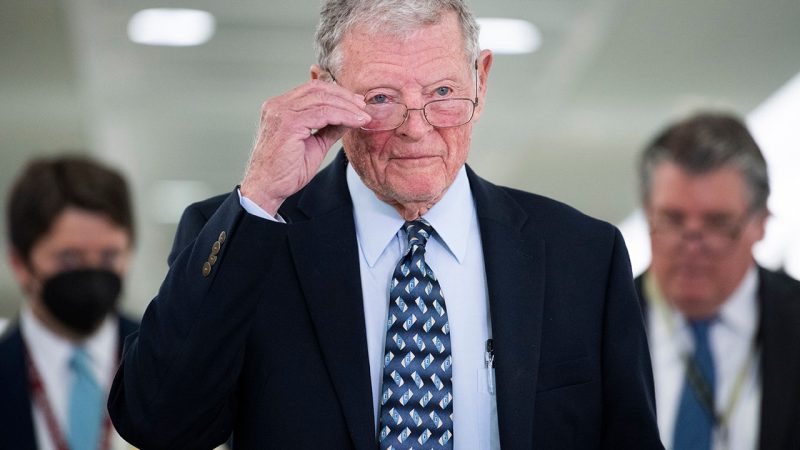
Republicans tout wins in the NDAA from repeal of vax mandate to increasing funds to combat China, Russia
Congress has passed the $858 billion defense bill to guide military and defense spending in 2023, and Republicans are cheering a whole slew of victories in the bill that range from bolstering resources to combat Russia and China to enhancing security for federal judges.
Republicans are touting wins, including ending the military COVID-19 vaccine mandate and banning Hollywood from censoring movies that were made in consultation with the military — like ‘Top Gun’ — to cater to China.
The National Defense Authorization Act, or NDAA, was cleared through the Senate on Thursday after the House passed it last week. The bill, which received broad bipartisan support, now heads to the White House for President Biden’s signature.
The top Republican of the Senate Armed Services Committee (SASC), Jim Inhofe, R-Okla., praised the bill’s passage Thursday, saying, ‘Conservatives in Oklahoma and across the United States can be proud of what we secured in this year’s bill to protect our country from threats like China and Russia and give our troops what they need to complete their mission.’
The final version of the NDAA increased defense funding by $45 billion above President Biden’s initial budget request, which Inhofe called ‘woefully inadequate.’
To address care for American troops and their families, the bill authorizes a 4.6% pay raise for both military service members and the Department of Defense civilian workforce, a Survivor Benefit Plan open season for the first time since 2005 and an increase to the maximum special and incentive payments and bonuses by over 30%.
To enhance military readiness, among other things, the bill prohibits the early retirement of combat platforms, like the F-22 fighter, and adds $5 billion to expand the U.S. Navy fleet and $7 billion for other military construction projects.
According to the SASC, the NDAA also prohibits Hollywood from ‘bowing to Chinese censorship for movies that U.S. military participates in, sending a strong signal to the Chinese people that the United States supports their right to watch uncensored movies.’
None of the funds authorized by the NDAA — meaning virtually all of the U.S. military — can be used to ‘knowingly provide active and direct support to any film, television, or other entertainment project if the Secretary of Defense has demonstrable evidence that the project has complied or is likely to comply with a demand from the Government of the People’s Republic of China or the Chinese Communist Party … to censor the content of the project in a material manner to advance the national interest of the People’s Republic of China.’
The NDAA also prioritizes U.S. nuclear modernization, amid China’s efforts to triple its nuclear arsenal, by continuing development of the nuclear Sea-Launched Cruise Missile, which Inhofe says is ‘is necessary to enhance deterrence against Russian advantages in tactical nuclear weapons and China’s massive nuclear expansion.’
The bill fully funds all U.S. nuclear modernization programs and prevents the Biden administration from pursuing unilateral nuclear disarmament by prohibiting the retirement of the B83 nuclear gravity bomb until a replacement program is in place.
The NDAA also includes the Daniel Anderl Judicial Security and Privacy Act, which enhances security of federal judges and their families. The bill was named after the late son of Judge Esther Salas, Daniel Anderl, who was murdered at home by a disgruntled litigant who had a case before her.
The bill also includes the Taiwan Enhanced Resilience Act, which authorizes $10 billion to boost Taiwan, a key ally for the U.S. in the Indo-Pacific amid China’s continued aggression.
Conservative groups like that Heritage Foundation had pushed for a provision in the NDAA that would prohibit taxpayer funds paying for travel for abortions of military members, but no such provision was added in the final compromise of the bill.
The White House called the repeal of the military vaccine mandate in the NDAA a ‘mistake’ Friday morning after the Senate’s vote, but it dodged on whether Biden would veto the legislation.
